#john deacon concepts
Explore tagged Tumblr posts
Text
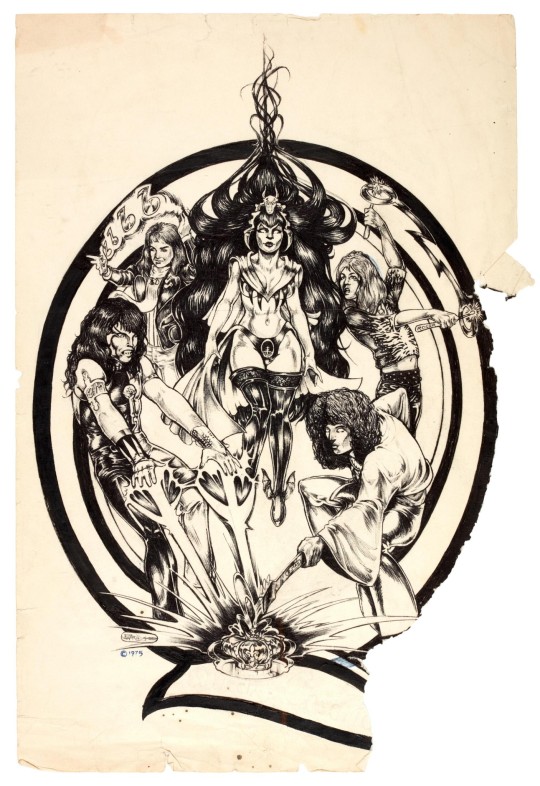
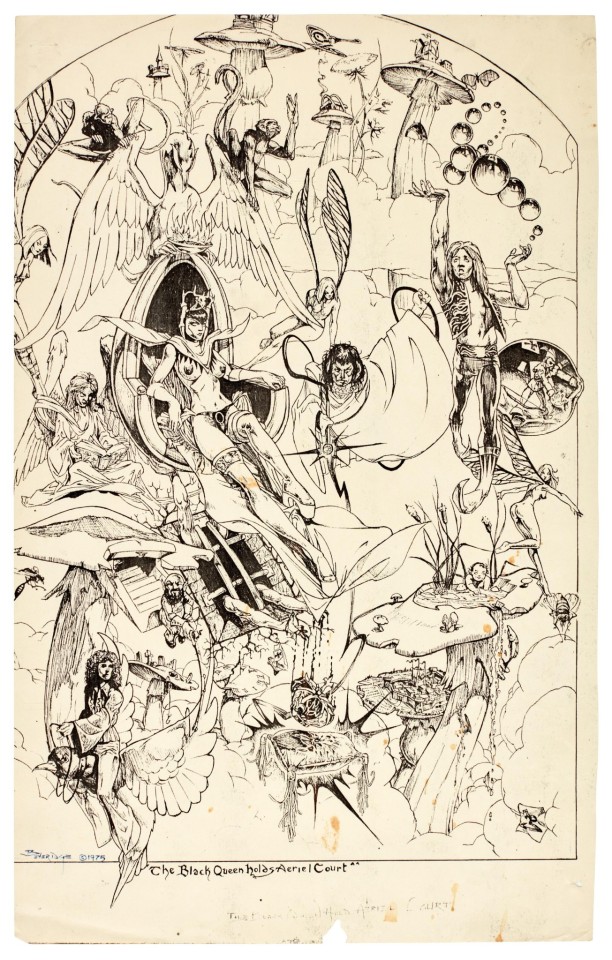
Source: Queen concept art, 1975 | Photocopy of ink drawing, signed and dated 1975
This concept artwork incorporates the 'Q' logo and the crown with the four band members in the fantasy style that Queen utilised in the early to mid 1970s alongside a central female figure. Accompanying this is a photocopy of another piece of concept art by the same artist, signed 'Beveridge', titled 'The Black Queen holds Aeriel Court'. The style is reminiscent of Richard Dadd's artwork.
NOTE (updated): I've been informed that the artist is JAMES F. BEVERIDGE
I swear to god I'M LOSING MY MIND AT THESE, YOU DON'T UNDERSTAND like HELLO??? MASTERPIECES??? It's so unfair we get to see these only now omg 😭😭😭 I love how the four of them are some sort of magicians with different powers, you know I live for these things. Also Deaky has wings??!?! 💕💕
Part of me wants to redraw this, but it's already so beautiful I know I wouldn't do it justice... but I could try to color it! 🤔
#queen in 1974: breathtaking fantasy concept art#queen in 2022: shitty stickmen barely moving in the 'worth it' video#anyway#I NEED A POSTER OF THIS#please?!??!?!?#queen#john deacon#queen fanart#?#queen band#john deacon queen#john deacon fanart#brian may#brian may queen#roger taylor#roger taylor queen#freddie mercury queen#freddie mercury#sothebys
165 notes
·
View notes
Text
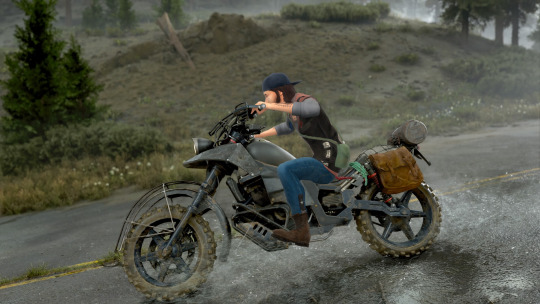
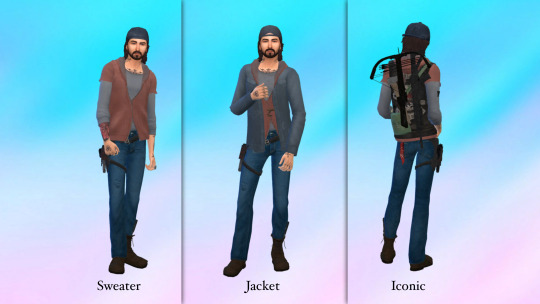
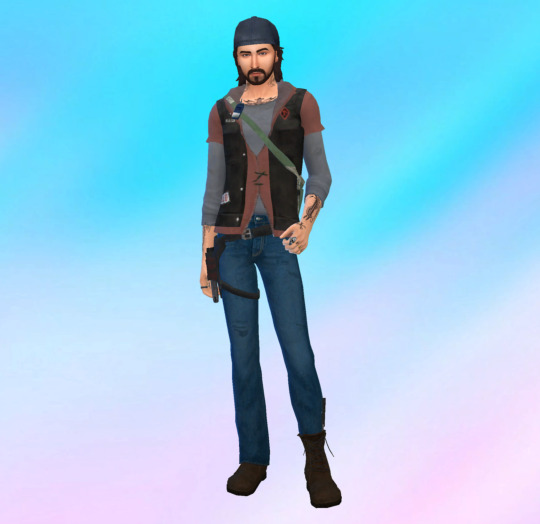
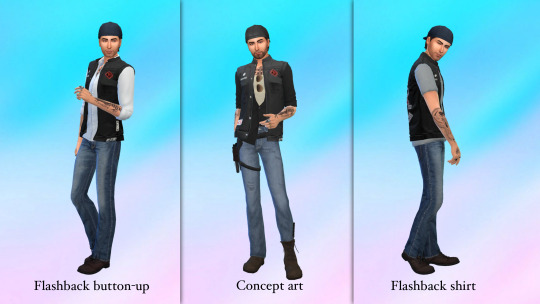
I made a Deacon St. John collection a few years back, but I never shared it... I guess I thought no one would know who he is. But now I'm thinkin' even if there's one person out there who might want this cc, they should be able to enjoy it :) So here it is!
Since this was made in like, idk, 2021 (?) it's a bit messier/dated than my current stuff. Also, I tried my best to remember who's meshes I used, but I just couldn't remember some :') I'm soryyyy
DOWNLOAD:
Sweater
Jacket
Iconic top (made using this from Darte77)
Jeans (made using this from @plazasims and this from DarkNighTt)
Flashback button-up
Concept art
Flashback shirt
Hat
Arm wound
Beard
Iconic hair (made using this from @candycottonchu)
Short hair
Tattoos
Bag (made using bag from unknown)
Bag weapons (found in necklaces) (made using this from Studio K-Creation, axe from unknown, and gun from unknown)
Rings (made using this from NataliS, and this from S-Club)
#the sims 4#thesims#sims#sims cc#sim#sims4#sims 4 custom content#sims custom content#the sims 4 cc#simblr#the sims#the sims 4 custom content#the sims 4 custom clothes#sims 4 cc#ts4 custom content#sims 4 download#s4cc#the sims cc#the sims custom content#days gone#deacon st john
32 notes
·
View notes
Text
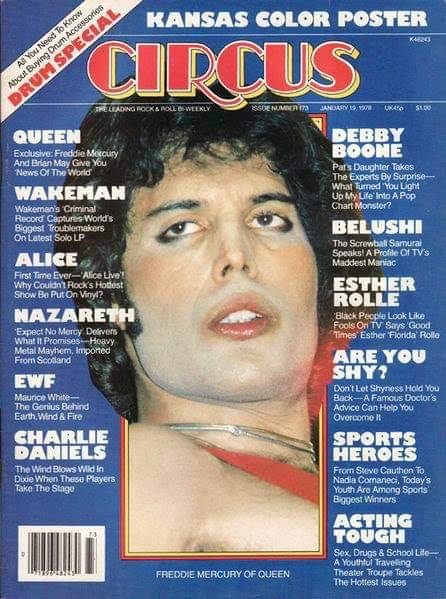
Today, on 19th January, 1978
Group Interviews - Circus Magazine
Queen Deserve Rock's Royal Crown?
by Rosy Horide
Freddie Mercury and Brian May Hawk their 'News Of The World'
Freddie Mercury is no longer the leader of Queen. Has he been fired, you ask, or is he off to pursue a solo career? No it's simply, with the advent of News Of The World LP (Asylum) the personality of the music and of Brian May, drummer Roger Taylor and bassist John Deacon have come across more strongly than ever before.
Those who have seen them on the recent US tour notice more than ever before that they're a group comprised of four separate identities, not just a lead singer and background band. Freddie Mercury is delighted to hear it.
'I've never considered myself the leader anyway,' says irrepressible Freddie. 'The most important person, perhaps.' And guitarist May agrees.
'Our separate identities do come to the fore on this album, on which every cut is completely different from the one before it and there's no concept at all. Apart from each having contributed two tracks to the album, Roger and John have been much more involved in the playing. Roger plays rhythm guitar on some of his cuts ('Sheer Heart Attack' and 'Fight From The Inside') which makes sense, because he had a better idea of how he wanted it to go. John plays acoustic guitar on one of his as well ('Who Needs You'). I played maracas on it. While we may not do it that way on stage, in the studio that makes more sense.'
Brian also does a lot more singing of his own songs on News, but he's content to let Freddie do the singing on stage.
'He's a natural performer,' asserts Brian. 'He acts on stage as if he was born doing it. That's great for us. We wouldn't want it any other way.'
As May and Mercury emphasize, it's not just musically that shifts occur in the group.
'John keeps a very close eye on our business affairs,' says Freddie. 'He knows everything that's going on and shouldn't be going on. If God forsakes us now the rest of the group won't do anything unless John says it's all right.
'Roger is very important to us in a different way. He's always been an out-and-out rock & roll fan with no time to stop and think about music and that's very good for us. Instinct. He's also the one who is most aware of facets in music, and that's essential in the band. If you listen to 'Sheer Heart Attack' on the new album you'll see what we mean. It sounds like a punk, or 'new wave' song, but it was written at the same time of the Sheer Heart Attack LP. He played it to us then but it wasn't quite finished and he didn't have time to complete it before we started recording. That was three years ago and now. . .almost all these records you hear are like that period.' And Roger now? 'He was into punk for a long time, but he's tired of it.' More about the album later.
But if you still don't believe no crown of leadership rests on the mercurial head of Freddie, it's worth repeating his comment about the composition of the group.
'If anyone left Queen, anyone of the four, that would be the end of Queen. We are four equal, interwoven parts. And the others just couldn't function the same without each quarter.'
Queen have just finished a special tour of the states. Not the longest they've ever undertaken, by any means, but special nevertheless.
'It was the first tour we've ever done without the support band,' Freddie explained. 'There was so much going on on stage that I doubt there would have been room for another band anyway. We have so much material we want to play for people now that it would have been far too long a concert. It's hard enough anyway to know what to leave out: we'd like to play all the new material, but there are some things we just would not dare leave out or I think the fans would lynch us.'
It was the sort of tour most rock bands dream of doing. Brian agrees: 'We've managed to get some of the most sought after halls there are, even though the tour was short. Most of them are places we've played before. In some cities we had to settle for second, alternative choice auditoriums - the thing was set up so fast. It was also a very compressed tour - 35 dates in six weeks. We did very large halls because we wanted to do a fuller show and our rig was about twice as big as ever we used before.
'It provided a complete stage environment, with an extension stage, three trailers and enormous lighting gimmick not just for New York and Los Angeles. That's why we booked big halls, so that we could give everybody the complete show. We first used our crown centerpiece at London's Earl's Court concert over the Jubilee. At the time, we didn't envisage being able to take the crown on tour with us, but we managed to have it demounted into a portable object. And so we had it for all the gigs. It made the most ambitious backdrop we've ever attempted, but it was worth it. The fans seemed to enjoy it and they are what matter.'
That last remark of Brian's is typical of the group's attitude towards their fans, for they have one of the closest rapports with the fans of any in the business. The same cannot be said for their relationship to the music press, however, especially in Britain. In fact, many people thought the chart-popping single 'We Are The Champions,' was Queen's way of telling the press in no uncertain terms that they've made it without them. Others thought it an arrogant statement about their rock supremacy. But how do they feel? First Freddie, who wrote the song:
'Certainly it's a relationship that could be, but I was thinking about football when I wrote it. I wanted a participation song, something that the fans could latch on to. It was aimed at the masses; I thought we'd see how they took it. It worked a treat. When we performed it at a private concert in London, the fans actually broke into a football chant between numbers. Of course, I've given it more theatrical subtlety than an ordinary football chant. You know me.
'I certainly wasn't thinking about the press when I wrote it. I never think about the British music press these days. It was really meant to be offered the musicians the same as the fans.
'I suppose it could also be construed as my version of 'I Did It My Way.' We have made it, and it certainly wasn't easy. No bed of roses as the song says. And it's still not easy.'
Brian concurs, 'You know, songs aren't always about what the words say. Messages in songs can appear different. I always see that as the difference between prose and poetry. Prose can mean exactly what it says, while poetry can mean the opposite. That goes for this song. Freddie's stuff is often tongue-in-cheek anyway, as you know. This song is very theatrical. Freddie is very close to his art. You could say, he's married to his music, whether it's 'I Did It My Way' or his 'There's No Business Like Show Business.' I must say, when he first played it for us in the studio we all fell on the floor with laughter. So many people in the press hate us because we've side-stepped them and got where we have without them.
'But there's no way the song says anything against our audiences. When the song says 'we,' it means 'us and the fans.' When we did that special concert, the fans were wonderful. They understood it so well. I know it sounds corny, but it brought tears to our eyes.'
Freddie and Brian are unanimous on that: the spontaneous responses to 'We Are The Champions' really move them. But that is the kind of general response News Of The World has received because, as Brian may says, 'It's a spontaneous album. I think we've managed to cut through to the spontaneity lacking in our other albums. I have no apologies to make for any of our previous albums. We're proud of them and wouldn't have let them out if we weren't. But I now feel some may have been over-produced, so we wanted to go with a more spontaneous rock & roll based album. It was nice to do something that didn't need such intensity. For example, with 'Sleeping On The Sidewalk' we did it in one take because it just seemed right the first time. We like to think of the album as a window on an unguarded moment, not a set piece. Each cut seems to do that, from the participation songs to Freddie's mood pieces. Even his numbers on the album are different, from his heavy 'Get Down, Make Love' to 'My Melancholy Blues,' which is just what it says.'
Brian admits that his own material is different too. But he still tries to keep his private life separate and out of his songs as much as possible.
'If you don't keep something back, it can be very bad for you.'
But for the band both the album and the tour are in the past and they have to look at the future. They got back to England on Christmas Eve.
'My mother would have killed me if I wasn't home for Christmas. I haven't missed one yet,' says Freddie. And the others felt the same.
It's time for some stock-taking. We've all become businessmen,' admits Freddie, 'even though it's against our better judgment. It's something that always happens if you get successful. Being a musician is not just cutting discs, unfortunately. I wish it was. We've all got companies now, some connected to music, others not. I'm producing Peter Straker, I have my car company. . . and lots of other fingers in other pies. We must take some time off to get things in perspective, or things will start to go wrong.
'Then there's been talk of doing a big world tour - Britain, South America, Japan, and of course the States as well as lots of other places. But that won't be until later in the year.'
So, American fans will have a chance to see Queen in 1978.
'You must tell them not to be too greedy, thought,' warns Freddie. They've already seen more of us than any other country.'
And what about a message for the American fans, Freddie?
'They know we love them. Apart from that, oh, say something outrageous for me.'
#1978#circus magazine#freddie mercury#queen band#london#zanzibar#legend#queen#brian may#john deacon#freddiebulsara#roger taylor#1978 interview#interview
30 notes
·
View notes
Note
I love the structure of the priest!John idea, but there was one detail that didn’t fit. John’s father wouldn’t have been a priest, because Catholic priests take vows of celibacy and don’t have kids. There are ways around it (became a widower, then became a man of the cloth with special dispensation because his children were grown might be the easiest), but it would take a bit of explaining. It’s a really interesting concept though, for John to be the one who was raised to be more traditional, and not have him be the leader of the debauchery for once. It highlights his struggles in a way more of us introverts can relate to <3
guys is it blaringly obvious I wasn't raised Catholic now 😅 geez I feel a little dumb lmaoo
okay someone mentioned in the comments of the original post that Johns father could have been a Deacon, priestly activities without the vow of celibacy and John could still be surrounded by that religion and raised by people who believed in it vehemently
so he was trained to want to become a priest or a Deacon, maybe he's still going through the process of becoming a priest when he meets Gale, not quite all the way there but still pretty intrenched in the religion and it's teachings
I think seeing John raised in that traditional Catholic family could be interesting to explore, especially if we get to see his eventual spiral into the man he was in canon, but yes like you said it highlights the internal struggles of John figuring out his beliefs in a quieter way than usual
(btw I apologize for being a little inaccurate with my hc, as I said I am not Catholic so I have little to no idea what all of that entails 😅😅)
11 notes
·
View notes
Text
The Ballad of Elle Douglas, Chapter 23
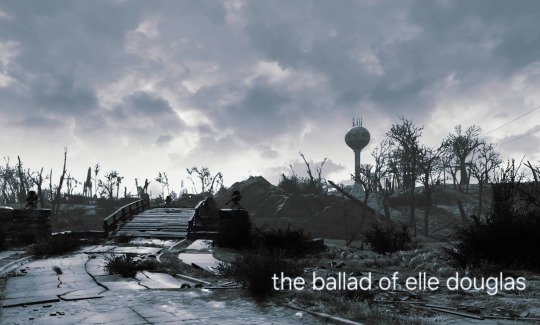
See Chapter 1 for Whole Work Summary Chapter 23
Chapter Summary: Nick has an interesting proposition for Elle.
Whole Work Rating: Explicit
Whole Work Archive Warnings: Graphic Depictions Of Violence, Major Character Death (described in detail), Rape/Non-Con (implied threat of)
Category: F/M, Gen
Fandom: Fallout 4
Chapter Word Count: 2.9k
Whole Work Relationships: John Hancock/Female Sole Survivor (Main Pairing), Paladin Danse/Female Sole Survivor, Edward Deegan/Female Sole Survivor, Robert Joseph MacCready & Sole Survivor, Sole Survivor & Nick Valentine, Arthur Maxson & Sole Survivor, Deacon & Sole Survivor, Preston Garvey & Sole Survivor, Sturges & Sole Survivor, Mama Murphy & Sole Survivor, Sole Survivor/Sole Survivor's Spouse, Father | Shaun & Sole Survivor, Synth Shaun & Sole Survivor
Whole Work Characters: John Hancock, Sole Survivor/Original Female Character, Paladin Danse, Edward Deegan, Nick Valentine, Robert Joseph MacCready, Arthur Maxson, Preston Garvey, Mama Murphy, Father | Shaun, Deacon, Elle Douglas (oc)
Additional Tags and Excerpt Under the Cut
Additional Tags: Commonwealth Minutemen, No Beta We Die Like Kellogg, Porn With Plot, Smut, Monogamy, Multiple Relationships, Canon-Typical Violence, Not Canon Compliant, Drama, Romance, Action/Adventure, Pining, Angst, Friends to Lovers, Slow Burn, Found Family, Suicidal Thoughts, Hancock is Endgame, Break Up
_________________
Elle couldn’t quite lose herself in the mindless crunch of her boots in the dead grass on the way back to Greentop.
The rhythm of her steps, her breath, the sway of her pack on her back counterbalancing the sway of her rifle in her hands all were present; but she couldn’t disappear into the simplicity of her movement as she walked. Her mind raced with various thoughts, each of the different concepts dipping in and out of her throughtstream seemingly at random, ducking and diving around each other like fish swimming upstream.
Wondering whether or not Danse had made it safely out of the Commonwealth triggered thoughts of Elder Maxson, Elder Maxson lead to thoughts of The Institute, and the Institute made her realize that to some extent, she felt an internal countdown clock hovering over her head, counting down until Shaun would expect to see her next. Under everything, coloring the water containing these thoughts, was a murky uncertainty about what, exactly, she had spent the last few weeks doing, and the vibrant tendrils of fear she felt at the idea of encountering more sites like the one they’d just left.
Elle frowned as she scanned the horizon, huffing out an annoyed breath, thoughts firmly planted on Shaun for the moment. She knew logically that if she had been needed by The Institute in these last few weeks, they would have sent one of the early Gen synths, or perhaps a Courser to come find her. She couldn’t decide if she was pleased at the freedom, or hurt that her son seemed, at best, entirely disinterested in having her around.
Elle tossed the thought away, turning to Nick and asking a question she hoped would distract them both. “Do you think it’ll snow?”
Nick pulled up short, and both of them adjusted their pace to more of a leisurely stroll automatically, so they could chat. Elle and Nick had walked the majority of the distance back from Lynn Woods quickly and in silence. Greentop was less than an hour away on foot, and even though the winter afternoon had nearly exhausted itself of light, they would arrive back at the settlement early enough to not worry about slowing their pace for a few moments.
Nick looked thoughtfully up at the grey-white sky. “No, I don’t.”
“It looks like it wants to,” Elle offered.
“As far as I know,” Nick replied, “it hasn’t snowed this close to the ocean since the bombs fell. Maybe you can find a pre-war Ghoul and ask them, but I haven’t seen it.”
“Do we know why?”
He shook his head. “It’s not like we have meteorologists to ask anymore.”
“Hmm,” Elle murmured, considering the issue as she placed her hand on a tree trunk, bracing herself to hop over a fallen log.
Nick circled around the end of the downed tree and rejoined her. “Could be,” he offered, “that the bombs heated up the atmosphere too much.”
“I always thought the concern with the bombs was nuclear winter,” Elle argued gently. “Like it would get too cold?”
She caught his shrug out of the corner of her eye as they moved.
“Maybe it was that, some kind of … unintended effect,” she went on. “Maybe it got too cold for snow?”
Nick chuckled, “you know, I didn’t have a very easy time understanding the weather before all this either. I would crack open the paper, scan past all that talk of the jet stream and the oceans and just look for the temperature it was gonna be that day. So I could dress for it.” He slowed to a stop, and Elle turned to look at him, her own feet slowing automatically.
“Or at least, Nick Valentine did,” he added. “Back in Chicago.”
Elle scratched the back of her neck awkwardly. “I think that counts. I remember doing the same thing. Back in Boston.” A sense of loss hung in the air around Elle like water vapor. She breathed it in.
Continue Reading on AO3
#the ballad of elle douglas#fallout 4#fallout4#fo4#fallout 4 companions#fallout companions#fanfic#longfic#ao3 fanfic#fallout fanfic#nick valentine#elle douglas
2 notes
·
View notes
Text
Queen in 5 Minutes — VoicePlay music video
youtube
The late, great Freddie Mercury is often quoted as having said, "Do anything you want with my music, but never make me boring." VoicePlay certainly took that sentiment to heart for this medley of memorable Queen songs, as well as the dramatic visual tale they made to go along with it. A battle for Earl's (after)life plays out in a suitably theatrical setting. Who will win?
Details:
title: Queen in 5 Minutes
original songs / performers: all songs by Queen — "Bohemian Rhapsody"; [0:32] "Play The Game"; [0:54] "Somebody To Love"; [1:20] "We Are The Champions"; [2:20] "Another One Bites The Dust"; [2:37] "We Will Rock You"; [2:45] "Under Pressure" with David Bowie; [2:52] "I Want to Break Free"; [3:14] "Good Old-Fashioned Lover Boy"; [3:32] "Play the Game" reprise; [3:48] "Bohemian Rhapsody" reprise; [4:16] "Radio Ga Ga"; [4:21] "The Show Must Go On"; [4:45] "Don't Stop Me Now"
written by: "Bohemian Rhapsody", "Play The Game", "Somebody To Love", & "We Are The Champions" by Freddie Mercury; "Another One Bites The Dust" by John Deacon; "We Will Rock You" by Brian May; "Under Pressure" by Queen & David Bowie; "I Want to Break Free" by John Deacon; "Good Old-Fashioned Lover Boy" by Freddie Mercury; "Radio Ga Ga" by Roger Taylor; "The Show Must Go On" by Brian May; "Don't Stop Me Now" by Freddie Mercury
arranged by: Layne Stein & Eli Jacobson
release date: 23 November 2018
My favorite bits:
recreating that iconic Bohemian Rhapsody intro
J.None's fantastic control, flipping between chest and head voice as he extracts Earl's heart 🫀 ⚖️
that smooth scoop from Earl on ⇗ ♫ "take a loooOOOK" ♫ ⇗
Geoff going full Chris Cornell at the start of "We Are the Champions" before dropping back into the underworld
J.None shoving the sword into Layne's hands to get him more involved as he sings about ♫ "fighting til the end" ♫
Eli's busting out that rock grit for "We Will Rock You"
Layne beatboxing the iconic stomp-stomp-clap rhythm rather than breaking viewers' immersion in the scene
Earl repelling everyone through the power of belting
the dismissive face Geoff makes at Eli as he continues the "Under Pressure" bass line into "I Want to Break Free" (a more serious take on the "Ice Ice Baby" bit from their "Old School Rap" medley)
Earl's plaintive vulnerability during "Lover Boy" solidifying into defiance for the return to "Bohemian Rhapsody"
the backing vocals pleading with Earl to ♫ "play the game" ♫ so they can guide him onward
ramping up into full concert mode as they form a line at the front of their "stage"
high tenor air guitar! 🎸
Eli and J's subtle counterpoint line from "Radio Ga Ga"
using "The Show Must Go On" to signal Earl's decision to return to the world of the living
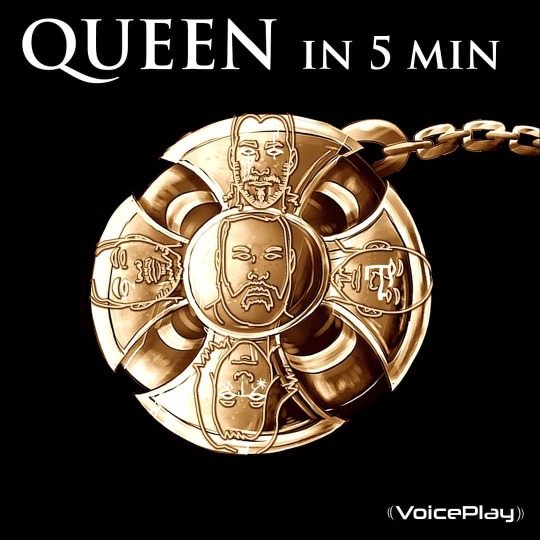
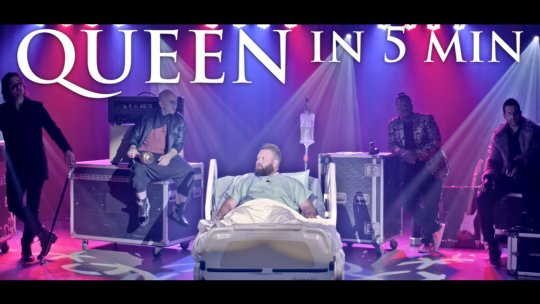

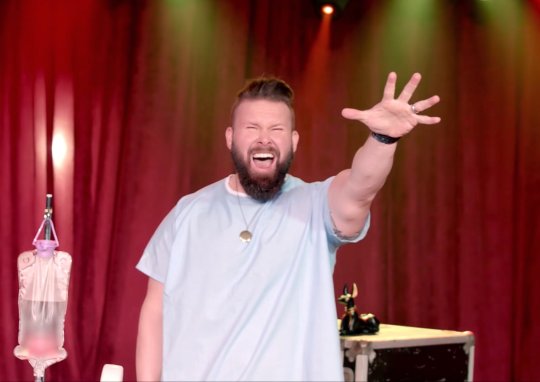
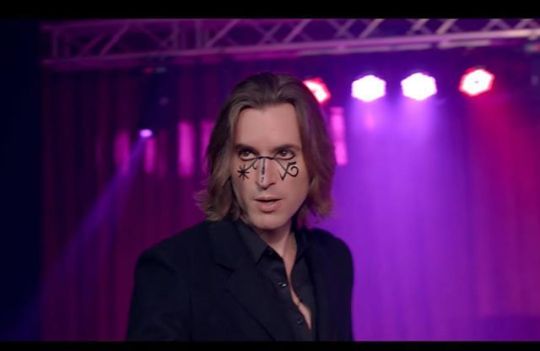
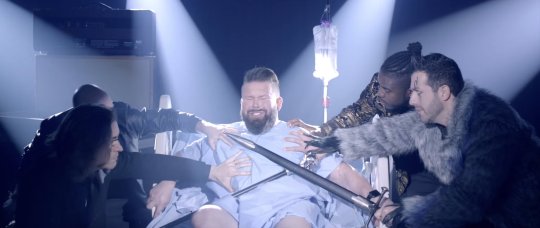
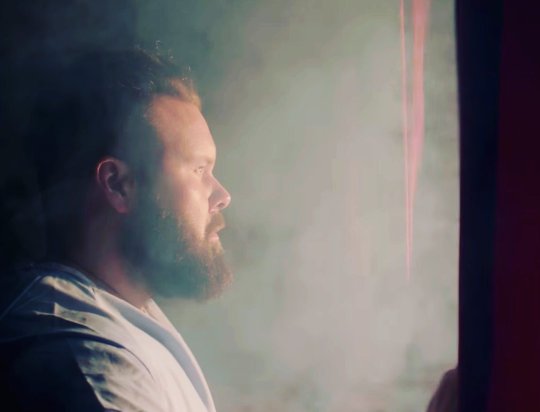
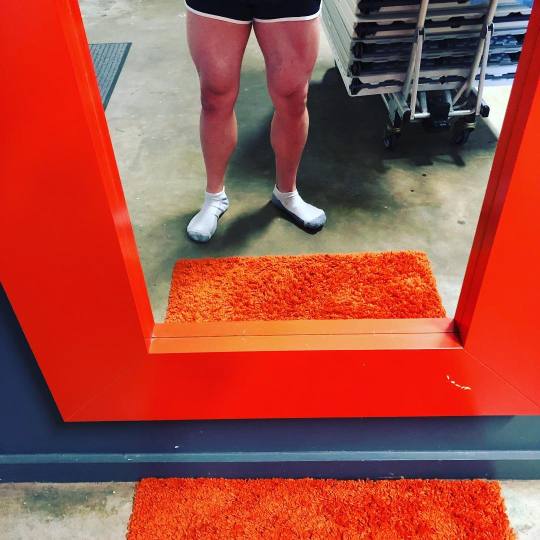
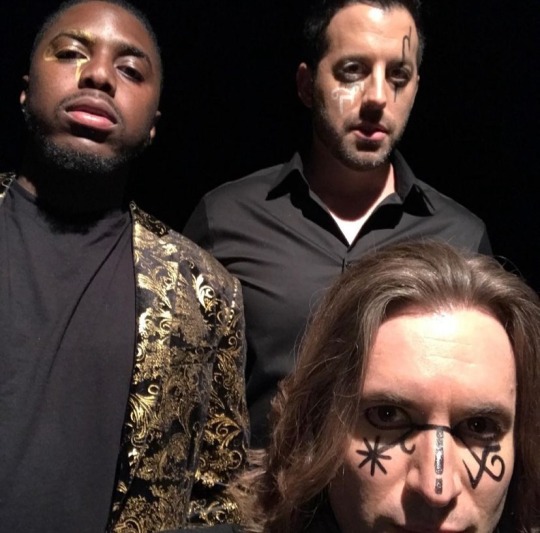
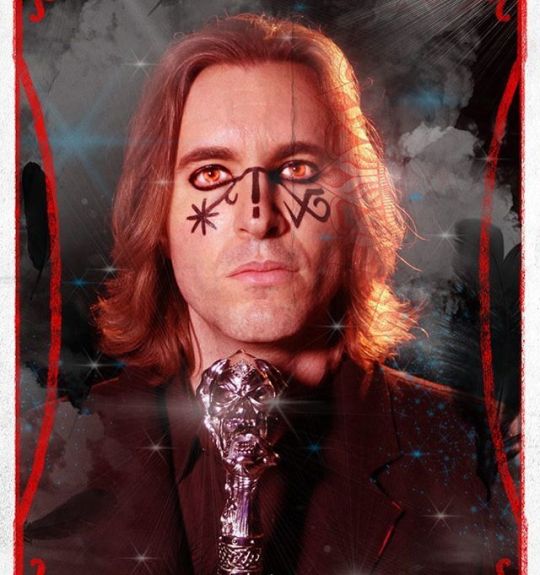
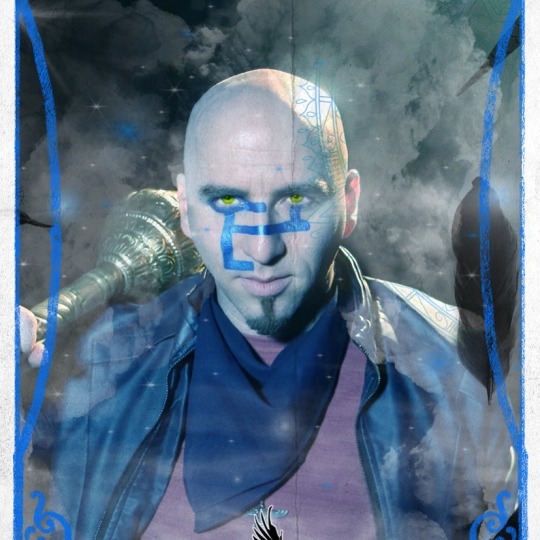
Trivia:
○ The man in the hospital framing scenes is Earl's husband, Nick. He has appeared on screen in a few VoicePlay videos, as well as doing production work on many more.
○ The four avatars of death come from various religious traditions:
Guardian (Layne) is an anthropomorphized version of Cerberus from Greek mythology, the multi-headed hound (hence the fur coat) who protects the gates of Hades.
Anubis (J.None) is the guardian of the dead and assessor of souls in the Egyptian pantheon, often depicted as a jackal.
Yama Nirvana (Eli) represents the Hindu god Yama, responsible for death, justice, and punishment of sinners in the afterlife.
Baron (Geoff) is an interpretation of the spirit Baron Samedi, master of the dead and resurrection in Haitian Vodou.
○ The guys' distinctive makeup and wardrobe were designed by artist Leon King. Of the four, J.None's costume changed the most from concept to execution, but each of them was tweaked a bit.
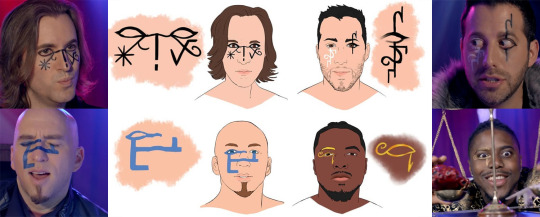
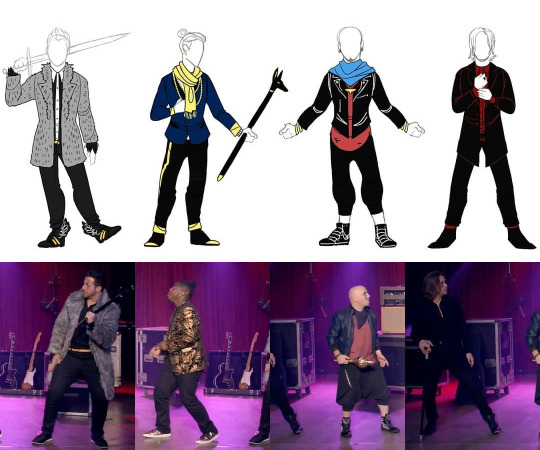
○ Leon also drew the central pendant element for the cover art.
○ The YouTube description includes the inscription, "We humbly dedicate this video to the music and memory of Freddie Mercury. The show must go on."
○ Some fans have embraced a headcanon that this video is a sequel to "Panic! in 4 Minutes". They theorize that Earl is in the hopital because he was injured by the explosion, and the avatars of death are manifesting as his bandmates within his unconscious mind. This hasn't been confirmed or denied by any members of VoicePlay, but it's a fun idea.
○ This video reached a million views on YouTube the following August.
○ The streaming audio version is split into two parts, "The Arrival" and "The Return", with the divide falling between "I Want To Break Free" and "Good Old-Fashioned Lover Boy".
○ The complete track was later included on VoicePlay's "Citrus" album, which compiled most of the songs they recorded from 2017-19. Because the individual songs had already been made available digitally, that album is exclusively a physical item that can only be purchased at live shows or through their website.
6 notes
·
View notes
Text
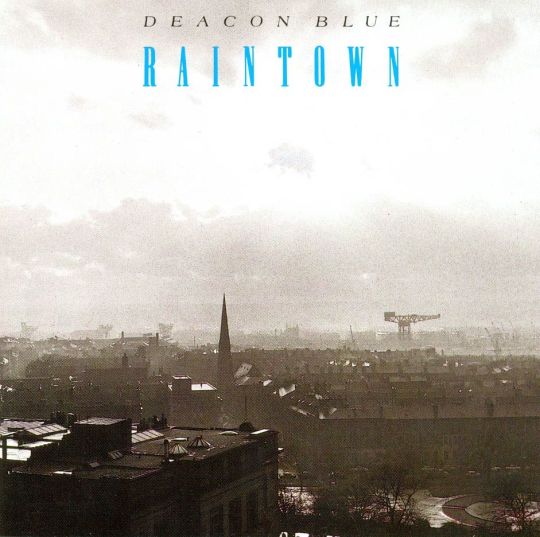
Storia Di Musica #291 - Deacon Blue, Raintown, 1987
Lo spunto per le storie settembrine me lo ha dato un aneddoto simpatico sugli Steely Dan, protagonisti dell'ultima storia di Agosto. Una delle loro canzoni più famose, Deacon Blues, da Aja (il loro capolavoro del 1977) fece un viaggio emozionale fino in Scozia, dove un giovane ragazzo si appassionava alla musica, soprattutto a quel pop così sofisticato, pieno di stratificazioni sonore, piccoli gioielli musicali incastonati nelle melodie, e immensa classe esecutiva. Ricky Ross si chiama quel giovane ragazzo, che dopo che a Dundee viene licenziato da professore precario delle scuole secondarie, si trasferisce a Glasgow, dove decidere di mettere su un gruppo. Prima trova il batterista, Dougie Vipond, poi un bravissimo pianista, James Prime, un chitarrista, Graeme Kelling, e una corista, Carol Moore. Le prime esibizioni sono incoraggianti, ma la Moore decide di mettersi da parte. Ross si ricorda che aveva sentito ad un provino, improvvisato in Bath Street, una ragazza che lascia il suo indirizzo, ma non il suo numero di telefono. E la storia vuole che fu lo stesso Ross ad arrivare sulla Great Western Road di Glasgow per chiedere a Lorraine McIntosh di unirsi al gruppo. E c'è la ciliegina sulla torna: durante uno delle prime serata acclamati dal pubblico, Dougie Vipond leggermente brillo incontrò Ewen Vernal, bassista, nel bagno di un locale e gli chiese di unirsi al gruppo. Il nome per la band è quello che Ross ha in testa da anni: Deacon Blue, e siamo nel 1985. Glasgow in quegli anni è una città in piena trasformazione sociale, anche con profonde fratture socio economiche (per farsi un'idea, suggerisco i romanzi di Douglas Stuart) ma dal punto di vista musicale sarà la capitale scozzese della musica. Tanto che un giornalista del Glasgow Herald, John Williamson, decise di produrre una cassetta in allegato alle pagine culturali del giornale con tutte le promesse della musica cittadina di quel periodo: ci sono futuri gruppi e artisti molto famosi come i Wet Wet Wet, Kevin McDermott, Hue and Cry e i Deacon Blue, che contribuiscono con Take The Saints Away.
Dopo questa esperienza, sono pronti ad andare in studio, insieme a Jon Kelly, capo ingegnere del suono agli Air Studios di Londra. Ross ha in mente una sorta di concept album su Glasgow, che ne racconti le sfumature più varie. Raintown, pubblicato nel 1987, si presenta con una meravigliosa foto in bianco e nero di Oscar Marziaroli, italo scozzese futuro acclamato fotografo, che ferma una città avvolta nella perenne pioggerellina con sullo sfondo uno dei simboli della città, la Finnieston Crane, una gigantesca gru portuale, ormai non operativa, simbolo dell'industriosità degli abitanti, proprio all'imbocco del porto cittadino. Dal punto di vista musicale, seppur si parte dall'idea di pop sofisticato del mitico duo da cui prendono il nome, i Deacon Blue mischiano il lirismo vocale e le atmosfere uniche di Van Morrison, un canto-racconto degno del primo Springsteen e un'eleganza che ha una sua totale particolarità. Il disco ha un andamento ondeggiante tra brani calmi e riflessivi e quelli più incalzanti: l'inizio è davvero suggestivo, con Born In The Storm che come una nebbia si dirada e sfuma in Raintown, canzone che è profondamente legata all'esperienza di Ross, con versi che dicono "Waiting for the phone to ring to make me all I am.\You're in the suburbs waiting for somewhere to go\I'm down here working on some dumb show\In a raintown" che raccontano l'inizio di tutta la storia. Ross scrive del rapporto con il business musicale nella bella Ragman e nell'altrettanto suggestiva Loaded, scritta di getto come un flusso di coscienza su una base improvvisata dagli altri componenti della band su una cassetta super 8, ed è capace di dipingere affreschi musicali persino drammatici in abiti delicati e affascinanti. He Looks Like Spencer Tracy Now è ispirata ad un pensiero, a che vita avesse fatto l'uomo che sganciò la bomba atomica su Hiroshima: tra incontri particolari ("he may have been with Oppenheimer, shaken Einstein's hand\Did we have to drop the bomb? You bet, to save this land\He was only taking pictures around the critical mass\While the troops on Tinian island sang 'Follow the bouncing ball') e cosa potrebbe essere oggi (He may have been a nationalist, a physicist or a pacifist (...) Well, I have seen that movie of Dr. Jeckyll and Mr. Hyde\And I know he looks like Spencer Tracy Now). When Will You (Make My Telephone Ring) ha ai cori il famoso gruppo R&B londinese dei Londonbeat. Alto livello è anche Chocolate Girl, che racconta di un tipo anaffettivo, un certo Alan, ricco e spendaccione, "He calls her the chocolate girl\Cause he thinks she melts when he touches her\She knows she's the chocolate girl\Cause she's broken up and swallowed\And wrapped in bits of silver". Ma il capoavoro è Dignity: ritratto di quello spirito scozzese della dignità del lavoro, racconta la storia di un impiegato comunale, probabilmente uno che lavora sulle strade, e che non perde il sorriso nemmeno quando è preso in giro dal ragazzini e che ha un sogno, comprare un gommone, un dinghy, che vuole chiamare Dignity, con cui "I'll sail her up the west coast\Through villages and towns\I'll be on my holidays\They'll be doing their rounds\They'll ask me how I got her I'll say, "I saved my money"\They'll say, "Isn't she pretty? That ship called Dignity". In Love's Great Fears, liricissima e tutta giocata sul duetto Ross - McIntosh, che diventeranno marito e moglie poco tempo dopo, c'è Chris Rea alla chitarra.
Il disco, per le qualità musicali, per la scelta azzeccata dei singoli e per la sua atmosfera sofisticata, che quasi inventerà un genere, ha un successo clamoroso: arriva fino al numero 14 nella classifica dei dischi più venduti, rimane in classifica un anno e mezzo e vende oltre un milione di copie. La band continuerà a scrivere belle cose, e il successivo When The World Knows Your Name del 1989 arriva persino al numero 1 in UK e contiene la loro canzone più famosa, Real Gone Kid, facendo divenire sogno il successo che un ragazzo scozzese aveva immaginato sentendo una canzone, Deacon Blues, che parla di nerds and losers, secondo le famose parole di commento di Donald Fagen. Dedicherò il mese di settembre a gruppi scozzese degli anni '80, che è un periodo storico e una zona geografica che ha regalato cosine niente affatto male alla storia della musica.
16 notes
·
View notes
Text
youtube

Release: August 22, 1990
Lyrics:
Yo VIP, let's kick it
Ice, ice baby
Ice, ice baby
Alright stop, collaborate and listen
Ice is back with my brand new invention
Something grabs a hold of me tightly
Flow like a harpoon daily and nightly
Will it ever stop? Yo, I don't know
Turn off the lights, and I'll glow
To the extreme, I rock a mic like a vandal
Light up a stage and wax a chump like a candle
Dance, go rush to the speaker that booms
I'm killing your brain like a poisonous mushroom
Deadly, when I play a dope melody
Anything less than the best is a felony
Love it or leave it, you better gangway
You better hit bull's eye, the kid don't play
If there was a problem, yo, I'll solve it
Check out the hook while my DJ revolves it
Ice, ice baby
Vanilla Ice, ice baby
Vanilla Ice, ice baby
Vanilla Ice, ice baby
Vanilla
Now that the party is jumping
With the bass kicked in, and the Vegas are pumping
Quick to the point, to the point, no faking
Cooking MCs like a pound of bacon
Burning them, if you ain't quick and nimble
I go crazy when I hear a cymbal
And a hi-hat with a souped up tempo
I'm on a roll, it's time to go solo
Rollin' in my 5.0
With my rag-top down so my hair can blow
The girlies on standby, waving just to say "Hi"
"Did you stop?" No, I just drove by
Kept on, pursuing to the next stop
I busted a left, and I'm heading to the next block
The block was dead, yo
So I continued to A1A Beachfront Avenue
Girls were hot wearing less than bikinis
Rockman lovers driving Lamborghinis
Jealous, 'cause I'm out getting mine
Shay with a gauge, and Vanilla with a nine
Ready for the chumps on the wall
The chumps acting ill because they're full of eight ball
Gunshots rang out like a bell
I grabbed my nine, all I heard were shells
Falling on the concrete real fast
Jumped in my car, slammed on the gas
Bumper to bumper, the avenue's packed
I'm trying to get away before the jackers jack
Police on the scene, you know what I mean
They passed me up, confronted all the dope fiends
If there was a problem, yo, I'll solve it
Check out the hook while my DJ revolves it
Ice, ice baby
Vanilla Ice, ice baby
Vanilla Ice, ice baby
Vanilla Ice, ice baby
Vanilla
Take heed 'cause I'm a lyrical poet
Miami's on the scene, just in case you didn't know it
My town, that created all the bass sound
Enough to shake and kick holes in the ground
'Cause my style's like a chemical spill
Feasible rhymes that you can vision and feel
Conducted and formed, this is a hell of a concept
We make it hype, and you want to step
With this, Shay plays on the fade
Slice like a ninja, cut like a razor blade
So fast, other DJs say "Damn!"
If my rhyme was a drug, I'd sell it by the gram
Keep my composure, when it's time to get loose
Magnetized by the mic while I kick my juice
If there was a problem, yo, I'll solve it
Check out the hook while D-Shay revolves it
Ice, ice baby
Vanilla Ice, ice baby
Vanilla Ice, ice baby
Vanilla Ice, ice baby
Vanilla Ice
Yo man, let's get out of here
Word to your mother
Ice, ice baby, too cold
Ice, ice baby, too cold, too cold
Ice, ice baby, too cold, too cold
Ice, ice baby, too cold, too cold
Songwriter:
David Bowie / Brian May / Freddie Mercury / John Deacon / Roger Taylor / Mario Johnson / Robert Van Winkle / Floyd Brown
SongFacts:
👉📖
#new#new music#my chaos radio#Vanilla Ice#Ice ice baby#music#spotify#youtube#hit of the day#music video#video of the day#youtube video#good music#90s#90s music#90s style#90s charts#90s video#1990#hip hop#hip hop rap#pop rap#southern hip hop#lyrics#songfacts#731#Spotify
7 notes
·
View notes
Text
Classic Rock Songs
Classic rock songs are a cherished part of music history, known for their timeless appeal and enduring popularity. Here's a brief overview of the history of classic rock songs:
Origins: Classic rock as a genre emerged in the mid-1960s and reached its zenith through the 1970s. It evolved from the rock and roll genre of the late 1940s and early 1950s, characterized by a fusion of various musical elements, including blues, R&B, and country.
The 1970s Golden Era: The 1970s witnessed a classic rock explosion with the rise of bands like Led Zeppelin, Pink Floyd, and Queen. Their albums and singles became anthems of a generation, defining the classic rock sound.
Subgenres: Classic rock is not limited to a single style; it encompasses a wide range of subgenres, from blues rock (e.g., Eric Clapton) to progressive rock (e.g., Yes) and folk rock (e.g., Crosby, Stills, Nash & Young).
Top Artists and their hits: Classic rock boasts a rich history of iconic bands and timeless hits. Here are some of the top classic rock bands and a selection of their most famous hits:
The Beatles: The Beatles were a British rock group that left an indelible mark on the music industry. Formed in Liverpool, England, in 1960, the band consisted of four principal members:
John Lennon
Paul McCartney
George Harrison
Ringo Starr
The Beatles grew out of a shared enthusiasm for American rock and roll. They started as a skiffle group called "The Quarrymen" and went through various name changes, including "The Beatals," before settling on "The Beatles."
Some of their hits:-
"Let It Be"
"Yesterday"
"Hey Jude"
"Come Together"
Led Zeppelin: Led Zeppelin, one of the most iconic rock bands in history, was formed in London in 1968. The group consisted of:
Robert Plant (vocalist)
Jimmy Page (guitarist)
John Paul Jones (bassist and keyboardist)
John Bonham (drummer)
The band initially came together as the New Yardbirds, with Jimmy Page being the final lead guitarist for the British blues band, The Yardbirds. However, they quickly changed their name to Led Zeppelin.
Some Of their Hits are:-
"Stairway to Heaven"
"Whole Lotta Love"
"Kashmir"
"Immigrant Song"
Pink Floyd: Pink Floyd is an iconic English rock band that was formed in London in 1965. The band gained an early following as one of the first British psychedelic groups, and they went on to become a seminal force in the world of rock music.
The original members of Pink Floyd included:
Roger Waters
Nick Mason
Richard Wright
Syd Barrett
They initially met while studying architecture at the London Polytechnic in Regent Street, London. The band's early years were marked by the leadership of Syd Barrett, who played a pivotal role in shaping their psychedelic sound. However, due to Barrett's deteriorating mental health, David Gilmour was brought in to replace him.
Pink Floyd's music journey saw them pioneer the concept album, achieving significant success in the 1970s with albums like "The Dark Side of the Moon" and "The Wall." These albums remain classics in the rock genre and are celebrated for their progressive and experimental approach to music.
Some of their greatest hits are:-
"Comfortably Numb"
"Wish You Were Here"
"Another Brick in the Wall"
"Time"
Queen: Queen is a renowned British rock band formed in London in 1970. The band was founded by Freddie Mercury (lead vocals, piano), Brian May (guitar, vocals), Roger Taylor (drums, vocals), and John Deacon (bass).
Throughout their illustrious career, Queen became known for their eclectic and dynamic musical style, blending rock, pop, and opera elements. Their music was characterized by powerful vocals from Freddie Mercury and the distinctive guitar work of Brian May.
Some of Queen's most famous songs include "Bohemian Rhapsody," "We Will Rock You," "We Are the Champions," "Another One Bites the Dust," and "Radio Ga Ga." Their 1975 album "A Night at the Opera" features the iconic track "Bohemian Rhapsody," which is often considered one of the greatest rock songs ever recorded.
Some of their greatest hits are:-
"Bohemian Rhapsody"
"We Will Rock You"
"Somebody to Love"
"Radio Ga Ga"
The Eagles: The Eagles are an iconic American rock band formed in Los Angeles in 1971. The band's founding members included Glenn Frey (guitars, vocals), Don Henley (drums, vocals), Bernie Leadon (guitars, vocals), and Randy Meisner (bass). Over the years, the lineup evolved, with members like Joe Walsh and Timothy B. Schmit joining the group.
Some of their greatest hits are:-
"Hotel California"
"Take It Easy"
"Desperado"
"Life in the Fast Lane"
These classic rock bands and their hits have left an indelible mark on the music industry and continue to be celebrated by music enthusiasts around the world. Their songs are considered classics and are frequently played on classic rock radio stations.
Check out more rock songs hits on https://musicfreak.in/classic-rock-songs-playlist/
Influence: Classic rock has left an indelible mark on the music industry and inspired subsequent generations of musicians. It remains a touchstone for artists in various genres, and its influence can be heard in contemporary rock music.
Modern Relevance: Classic rock's appeal endures in the 21st century, with new generations discovering and appreciating the genre's iconic songs. Classic rock radio stations and music festivals keep the spirit alive.
Classic rock songs are more than just music; they are a cultural phenomenon, a bridge between eras, and a testament to the timelessness of great artistry.
For More Playlists Visit our website:- https://musicfreak.in/
2 notes
·
View notes
Text




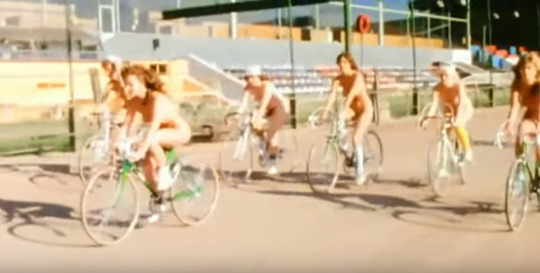
Queen: "Bicycle Race" / "Fat Bottomed Girls" (1978)
Queen's career achieved it 1970s peak with the release of '77’s News of the World and its world-conquering, chart-topping, double A-side single featuring not one but two sporting anthems for the ages in "We are the Champions" and "We Will Rock You."
So it goes without saying that following up such remarkable success must have felt like a daunting prospect for singer Freddie Mercury, guitarist Brian May, bassist John Deacon, and drummer Roger Taylor, as they set to work on their seventh studio LP in '78.
The resulting Jazz was arguably Queen's most eclectic to date (and that's saying something), thanks to many-splendored curiosities like “Mustapha,” ‘‘Dreamer’s Ball,” “Fun It,” “Jealousy,” “Dead On Time,” and “Don’t Stop Me Now.”
More importantly, Queen knew a good gimmick when they found it, so they came up with another double A-side single concept boasting two inextricably linked (though less obviously so) tracks in "Bicycle Race” and "Fat Bottomed Girls."
Issued 45 years ago, and one month ahead of the LP, the single arrived in a controversial sleeve showing a curvaceous young lady sitting astride a bicycle, her generous bum only barely covered by an obviously hand-drawn bikini bottom.
What's more, the image originated in an intentionally scandalous publicity stunt wherein over fifty stark-naked models participated in a bicycle race staged at Wimbledon Stadium, sparking the vocal disapproval of women's rights groups -- and the bike-leasing company's refusal to accept the used seats back, after the fact.
In other words, it worked like a charm!
Although, I hardly think it was needed, since "Fat Bottomed Girls" was another typically infectious May hard rocker, strategically edited by almost a minute here, while Freddie boisterously expressed the group's appreciation with words like:
"I was just a skinny lad; Never knew no good from bad; But I knew life before I left my nursery; Left alone with big fat Fanny; She was such a naughty nanny; Heap big woman, you made a bad boy out of me ...
Oh, won't you take me home tonight? Oh, down beside your red firelight? Oh, and you give it all you got; Fat bottomed girls, you make the rocking world go around.
Get on your bikes and ride!"
Meanwhile, "Bicycle Race" may have been the band's most playful, frivolous song since "Killer Queen" -- words that would feel like an insult to any band EXCEPT Queen.
Inspired by watching the Tour de France roll by their Montreaux studio, the song was a staple Freddie vehicle, full of racy double-entendres, campy sing-along melodies, tightly multi-tracked vocals, all culminating in -- you guessed it -- a mini-symphony of ringing bicycle bells.
"Bicycle races are coming your way; So forget all your duties, oh yeah; Fat bottomed girls, they'll be riding today; So look out for those beauties, oh yeah; On your marks! Get set! Go!"
And "go" it did, cracking the Top Ten in singles charts worldwide, reaching No. 11 in the U.K., and No. 24 in the U.S., where it was eventually certified platinum -- not "We are the Champions" numbers, but not bad at all.
Certainly, no one could accuse Queen of not having a sense of humor.
More Queen: Queen, Queen II, Sheer Heart Attack, A Night at the Opera, A Day at the Races, News of the World, Jazz, Live Killers, The Game, Flash Gordon, Hot Space, The Works, A Kind of Magic, The Miracle, Innuendo, Made in Heaven, Live at the Rainbow ‘74.
1 note
·
View note
Text
The Short Story Behind Catholic Men Chicago Southland (CMCS)

(click here for the long story)
By Frank J Casella, CMCS Executive Director
Our mission at Catholic Men Chicago Southland is to empower local Catholic men to deepen their spiritual lives and bring Jesus Christ into their daily relationships. This vision was born in 2004 when Deacon John Rangel, David Taylor, and I met with Reverend Bishop Joseph N. Perry to seek his blessing for our initiative. Although Bishop Perry is now retired, his legacy continues to inspire our mission today.
We initially sought Bishop Perry's guidance because of his role as our local Vicar in Vicariate VI on the far south end of the Archdiocese of Chicago. We recognized the importance of having a strong foundation and platform to support our efforts. Bishop Perry not only understood the value of our initiative but also encouraged us to challenge men in the Vicariate to live up to the virtues of a Catholic man and make Christ the center of their lives.
Our decision to maintain a manageable size within the Vicariate has proven to be a wise choice. This approach allows us to provide a template for other groups seeking to establish similar initiatives in their own Vicariates. While there has been significant interest, only one commitment has been made in the Edgewater area of Chicago.
As a third-generation Knight of Columbus, I have a deep understanding of the importance of Catholic men's ministry. However, I realized that there was a need for a Catholic men's spirituality prayer breakfast that would challenge men to replace bad habits with good habits and develop a holy life. This concept is rooted in the idea of "feeding the stomach and then feeding the soul."
In the 1980s, men's conferences began to emerge, but many fell short of making a lasting impact on men's lives. I believe that we need Catholic men who model virtues and goodness, making a positive difference in the lives of others. As Matthew Kelly once said, "We are a people of possibility, the Holy Spirit is the great encourager … holiness is possible."
Jesus Christ desires a personal relationship with each of us, but he also wants us to be in covenant with him. This covenant is rooted in the New Covenant established through his sacrifice and renewed through the Holy Eucharist. When we gather at the family table for the sacred meal, we become one with Christ and with each other.
In the home, men are called to lay down their lives for their wives, serving them as Jesus served the Church. The Christian home is the domestic church, a community of grace and prayer, where children receive their first proclamation of the faith. As Saint Paul said, "Power is made perfect in weakness," reminding us that our strength lies in our vulnerability and dependence on others.
Jesus wants us to know not only the Father and the Holy Spirit but also his Blessed Mother and all his sainted brothers and sisters. He desires us to live according to the family structure he established for his Church on earth, with the Pope and all the bishops and priests united to him.
The Gospel is not about setting up a legal system but about transforming hearts, freeing people from the darkness and slavery of sin. As Cardinal Francis George once said, "We as a Catholic Church have much to learn from our Protestant brothers and sisters about marketing and promotion, and evangelization."
In response to this challenge, we began an online ministry in 2009 to reach Catholic men in any way possible and learn from those who are skilled in evangelization. However, Bishop Perry reminded us to balance our online efforts with in-person worship and community involvement in the pews. Community is the foundation of our Catholicism, and we strive to nurture Catholic men's spirituality through in-person gatherings and Mass.
Our approach is not about accountability to each other but about covenant with Jesus, which transforms us as men. When we foster a man in holiness, the positive adjustments he makes create a positive impact that can be felt for three generations. This takes transforming one man at a time from good intentions into right-action, developing a holy church, and recognizing the essential role of fathers in a healthy family.
0 notes
Text
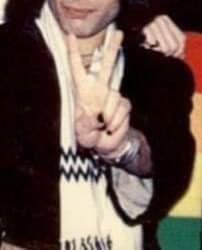
Today, on April 5th, 1970 - Queen Story!
Freddie Mercury, Brian May and Roger Taylor were in Roger's flat and decided to form a new band
🔸“The concept of Queen is to be regal and majestic,” he told the English press early in their career. “Glamour is a part of us and we want to be dandy. We want to shock and be outrageously instantly”.
More than anything else, Freddie Mercury wants to be a legend. The vehicle for the 28 year-old “Kensington poseur” is a rock’n’roll band called Queen, and the meticolous Mercury seems to have the situation neatly in hand. He came up with the band’s name, he designed their crest (combining the star signs of its members), and he defines their style.
Smile was a local group featuring Roger Taylor on drums and Brian May on guitar. Freddie, who had been singing with groups since he was 14 years-old, was himself performing in small, unmentionable bands while studying the art of Mucha and Arthur Rackham. All the bands in the area used to keep tabs on each others’ music and even occasionally traded equipment. In 1970, Smile broke up in general frustration, and Freddie quickly cornered Taylor and May to sell them on his idea for a hotshot band to be called Queen. The pair approved, invited Freddie to join them, and after six months of auditions, the lineup was completed when they signed on John Deacon as their charter bassist. For months they practiced, playing only small, select shows for their friends and word-of-mouth fans instead of grinding through the usual provincial club circuit.
- Freddie Mercury
Interview, 1975 - Circus Magazine
Queen’s Freddie Mercury Shopping For An Image In London
by Scott Cohen
➡️ In the original photo Freddie Mercury is with other members of the group in a color photo used as the cover of the single 'Now I'm Here /' Lily Of The Valley 'Japanese Sleeve, 1975
Taken from 'Sheer Heart Attack' album, 1974
#new band#april 5#queen band#freddie mercury#london#zanzibar#legend#queen#brian may#john deacon#freddiebulsara#roger taylor#1970
15 notes
·
View notes
Text
The Ballad of Elle Douglas, Chapter 16
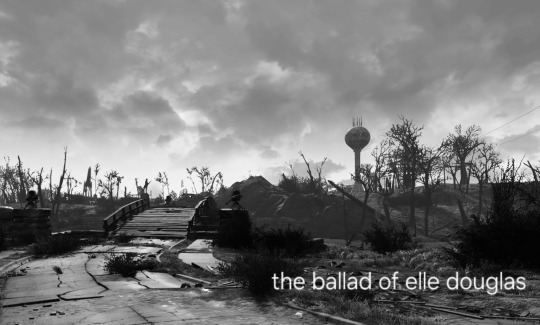
See Chapter 1 for Whole Work Summary
Chapter 16
Chapter Summary: After a short detour, Elle finds herself back in Sanctuary. She's just in time to finally discuss Preston's offer.
Whole Work Rating: Explicit
Whole Work Archive Warnings: Graphic Depictions Of Violence, Major Character Death (described in detail), Rape/Non-Con (implied threat of)
Category: F/M, Gen
Fandom: Fallout 4
Chapter Word Count: 4.4k
Whole Work Relationships: John Hancock/Female Sole Survivor (Main Pairing), Paladin Danse/Female Sole Survivor, Edward Deegan/Female Sole Survivor, Robert Joseph MacCready & Sole Survivor, Sole Survivor & Nick Valentine, Arthur Maxson & Sole Survivor, Deacon & Sole Survivor, Preston Garvey & Sole Survivor, Sturges & Sole Survivor, Mama Murphy & Sole Survivor, Sole Survivor/Sole Survivor's Spouse, Father | Shaun & Sole Survivor, Synth Shaun & Sole Survivor
Whole Work Characters: John Hancock, Sole Survivor/Original Female Character, Paladin Danse, Edward Deegan, Nick Valentine, Robert Joseph MacCready, Arthur Maxson, Preston Garvey, Mama Murphy, Father | Shaun, Deacon, Elle Douglas (oc)
Additional Tags and Excerpt Under the Cut
Additional Tags: Commonwealth Minutemen, No Beta We Die Like Kellogg, Porn With Plot, Smut, Monogamy, Multiple Relationships, Canon-Typical Violence, Not Canon Compliant, Drama, Romance, Action/Adventure, Pining, Angst, Friends to Lovers, Slow Burn, Found Family, Suicidal Thoughts, Hancock is Endgame, Break Up
_________________
“Excellent work today, Mother.” Shaun’s bright green eyes glimmered in Elle's direction, riotously lit by the fluorescent bulbs.
Elle searched said eyes, and thought she may have even seen genuine pleasure in them. Shaun smiled at her and she returned it.
“Thanks, Shaun,” she said awkwardly. “I’m glad I could help.”
He nodded briskly. “I have one final thing for you today. No further tasks are required, but I wanted to give you this key.” He held out a small plastic card.
Elle reached for it, pushing down thoughts of Maxson and his final punishment for her as Shaun dropped the key easily into her palm. It was the same white as the walls and floors of The Institute, with one small orange stripe along the bottom edge.
She turned it over in her fingers. “What’s it for?”
“I’ve arranged for you to have quarters here," Shaun explained. "I have no doubt you’ll be in and out of The Institute as you go about your business, but I was hopeful that at some point, you’d begin to think of this place as home, the way I do.”
As far as Elle knew, Shaun’s rusted, sky-blue crib still stood in the yard behind the northwest corner of her former house. She had seen it in a pile of items that the settlers in Sanctuary had placed there, likely to sort for salvage.
It didn't take a fully-licensed psychiatrist to explain why her mind had called up that particular image, just then.
She bit the inside of her cheek. “Thank you, I appreciate it.”
The old man who was a perfect mix of Elle and Nate, smiled. “I also went ahead and had a few things stocked in your quarters, including some weapons and clothing. There’s also a comfortable bed, and a shower,” he explained magnanimously.
“That’s really very kind, Shaun.” Elle sounded far away as she spoke, even to herself.
He studied her for a brief moment. “The word ‘home’ has upset you.”
Elle forced a gentle smile across her lips, wondering if she was succeeding at the illusion of softness. In truth, it felt like she was baring her teeth at the man in front of her. She closed her eyes briefly, ruefully, before speaking. “That’s a complex concept for me, given the situation.”
“Yes, of course,” her son agreed, projecting an ease she wasn’t sure either of them felt. “Plus, you’re likely tired from the day.”
Elle nodded. “Thank you again, I’m looking forward to that shower.” Feeling more in control, she smiled broadly.
“But you won’t stay?” Elle couldn't be sure if Shaun was disappointed, or relieved.
It was even more exhausting than a regular conversation, what with all the guessing she was constantly doing at her son's emotional state.
“Maybe not tonight," she replied. "I have friends who are waiting for me to return.”
Shaun nodded. “Understood.”
Continue Reading on AO3
#the ballad of elle douglas#fallout4#fallout 4#fo4#fanfic#longfic#ao3 fanfic#fallout 4 companions#fallout companions#shaun fo4#paladin danse#danse/f!sole survivor#danse/f!sole#preston garvey#elle douglas
2 notes
·
View notes
Note
My opinions for, what they're worth:
I would love you to look at the history of the Trinity as a concept. It only occurred - what, 300 years in, from memory? And it was laughed out of countenance when first suggested.
It depends what you mean by "Trinity". Yes, a fully elaborated Trinitarian theology first appeared at Nicaea. But long before then, Christians had been proposing that the Son was divine in at least some sense. One of the earliest and strongest examples of this is St. Ignatius of Antioch, who was writing around 110 AD:
Since therefore I have, in the persons before mentioned, beheld the whole multitude of you in faith and love, I exhort you to study to do all things with a divine harmony, while your bishop presides in the place of God, and your presbyters in the place of the assembly of the apostles, along with your deacons, who are most dear to me, and are entrusted with the ministry of Jesus Christ, who was with the Father before the beginning of time, and in the end was revealed. (Epistle to the Magnesians chapter 6)
There is one Physician who is possessed both of flesh and spirit; both made and not made; God existing in flesh; true life in death; both of Mary and of God; first passible and then impassible — even Jesus Christ our Lord. (Epistle to the Ephesians chapter 7)
Or from my favourite Ante-Nicene theologian, St. Justin Martyr, writing around 150 AD in his Dialogue with Trypho:
As you wish, Trypho, I shall come to these proofs which you seek in the fitting place; but now you will permit me first to recount the [Old Testament] prophecies, which I wish to do in order to prove that Christ is called both God and Lord of Hosts, and Jacob, in parable by the Holy Spirit... (chapter 36)
Christ, Son of God, who was before the morning star and the moon, and submitted to become incarnate, and be born of this virgin of the family of David, in order that, by this dispensation, the serpent that sinned from the beginning, and the angels like him, may be destroyed, and that death may be condemned, and for ever quit... (chapter 45)
In fact, I'd even say that a theology of multiple divine persons is older than Christianity. I found this in Borderlines: The Partition of Judaeo-Christianity, an account of the split between Judaism and Christianity by Jewish scholar Daniel Boyarin. One of the central points of the split is that Christians embraced what Jews called "two powers in Heaven", the idea that there were two divine persons, a primary transcendent one and a secondary immanent one, which prior to the rise of Christianity had a wide distribution in Judaism, only being rejected because it became strongly associated with Christian worship of Jesus. They taught this partly to solve the paradox of god being simultaneously transcendent and immanent, but also because it resolved several contradictions in the Bible - for example, God has white hair in Daniel's vision (Daniel 7:9), but the Male Lover of Song of Songs, who they interpreted as the God of Israel, has black hair (Song of Solomon 5:11). Hence, they further interpreted Daniel 7 to have two divine persons, the Ancient of Days and the Son of Man.
The concept of the Trinity itself does not make logical sense. How can God be multiple persons? Do we not believe in one God? A man cannot be his own father, he can only be like him.
For me, the best explanation of the Trinity has always been from Book 1 Chapter 8 of St. John of Damascus' Exposition of the Orthodox Faith. I'm highlighting the bits in red about how God is three, and in blue how God is one.
Owing to the three persons, there is no compoundness or confusion: while, owing to their having the same essence and dwelling in one another, and being the same in will and energy and power and authority and movement so to speak, we recognise the indivisibility and the unity of God. For verily there is one God, and His word and Spirit.
We have one mediator between God and man, the man Christ Jesus. If he's somehow God, that falls through.
What us Trinitarians would say is that becoming human was what enabled Christ Jesus to mediate for us; furthermore, I'd argue (and I'll be cribbing a lot from Dr. Cyril Jenkins' "Some Passing Thoughts on Imputed Righteousness") that Christ had to be divine and human to be the one mediator. If Christ saves us by being sinless and thus acceptable to God, that makes sinlessness the mediator between God and man, and theoretically Adam could have done it, since he had no sin prior to the Fall. However, if the thing that saves us is the union of human and divine nature, and human and divine nature are united only in Jesus Christ, then Jesus Christ Himself is the mediator between God and man.
I hope this was respectful; I don't want this to come off as an attack on you or your theology, but as me explaining why I disagree and what I think instead.
Unfortunately, someone who rejects who Jesus Christ says he is is *not* believing in him and Scripture.
I see and trust that your faith is important to you, and that you are pursuing God from the right place, but denying the trinity remains a heresy, in spite of your church teaching it as fact!! And as much as I am one who always says that I don’t know but hope God will have grace for those who didn’t understand but wanted to, the BEST thing for anyone is to embrace the FULL TRUTH. The Word was with God and the Word was God, and Jesus is the Word made flesh!
If you are a Christian, that means putting your full faith in Christ and his power: with God and as God.
I would love you to look at the history of the Trinity as a concept. It only occurred - what, 300 years in, from memory? And it was laughed out of countenance when first suggested. I don't have sources for this currently but I read it once.
The concept of the Trinity itself does not make logical sense. How can God be multiple persons? Do we not believe in one God? A man cannot be his own father, he can only be like him. We have one mediator between God and man, the man Christ Jesus. If he's somehow God, that falls through. The point is that he's a man like us, but without sin. If he's just a piece of God (forgive my clumsy phrasing), that makes his sacrifice far less meaningful, and empties the cross of Christ of its power.
God bless you, anon.
68 notes
·
View notes
Text
Today the Church honors St. Dionysius the Areopagite, Bishop and Theologian, St. Rusticus, Priest, St. Eleutherius, Deacon, all Martyrs.
Orate pro nobis.
Saint Dionysius lived originally in the city of Athens. He was raised there and received a classical Greek education. He then went to Egypt, where he studied astronomy at the city of Heliopolis. It was in Heliopolis, along with his friend Apollophonos where he witnessed the solar eclipse that occurred at the moment of the death of the Lord Jesus Christ by Crucifixion. “Either the Creator of all the world now suffers, or this visible world is coming to an end,” Dionysius said. Upon his return to Athens from Egypt, he was chosen to be a member of the Areopagus Council (Athenian high court).
When the holy Apostle Paul preached at the place on the Hill of Ares (Acts 17:16-34), Dionysius accepted his salvific proclamation and became a Christian. For three years Saint Dionysius remained a companion of the holy Apostle Paul in preaching the Word of God. Later on, the Apostle Paul selected him as bishop of the city of Athens. And in the year AD 57, Saint Dionysius was present at the repose of the Mary, the mother of Jesus..
During the lifetime of the Mary, Saint Dionysius had journeyed from Athens to Jerusalem to meet her. In one of the few extant eyewitness accounts of Mary, he wrote to his teacher the Apostle Paul: “I witness by God, that besides the very God Himself, there is nothing else filled with such divine power and grace. No one can fully comprehend what I saw. I confess before God: when I was with John, who shone among the Apostles like the sun in the sky, when I was brought before the countenance of the Most Holy Virgin, I experienced an inexpressible sensation. Before me gleamed a sort of divine radiance which transfixed my spirit. I perceived the fragrance of indescribable aromas and was filled with such delight that my very body became faint, and my spirit could hardly endure these signs and marks of eternal majesty and heavenly power. The grace from her overwhelmed my heart and shook my very spirit. If I did not have in mind your instruction, I should have mistaken her for the very God. It is impossible to stand before greater blessedness than this which I beheld.”
After the death of the Apostle Paul, Saint Dionysius wanted to continue with his work, and therefore went off preaching in the West, accompanied by the Presbyter Rusticus and Deacon Eleutherius. They converted many to Christ at Rome, and then in Germany, and then in Spain.
The writings of Saint Dionysius the Areopagite hold great significance for the Orthodox Church. Four books of his have survived to the present day:
On the Celestial Hierarchy
On the Ecclesiastical Hierarchy
On the Names of God
On Mystical Theology
In additional, there are ten letters to various people.
The theology of the Orthodox Church is totally based upon experience of divine knowledge. In order to know God it is necessary to be in proximity to Him, to have come near to Him in some measure, so as to attain communion with God and growth in sanctification, or deification (theosis) in Orthodox language. This condition is accomplished through prayer. This is not because prayer in itself brings us close to the incomprehensible God, but rather that the purity of heart in true prayer, which is humble silence and stillness of the heart and mind, allows us to become aware of the already close presence of God.
The written works of Saint Dionysius the Areopagite are of extraordinary significance in the theology of the Orthodox Church, and also for late Medieval Western Catholic theology. For almost four centuries, until the beginning of the sixth century AD, the works of this holy Father of the Church were preserved in an obscure manuscript tradition, primarily by theologians of the Alexandrian Church. The concepts in these works were known and utilized by Clement of Alexandria, Origen, Dionysius the Great, pre-eminent figures of the catechetical school in Alexandria, and also by Saint Gregory the Theologian. Saint Dionysius of Alexandria wrote to Saint Gregory the Theologian a Commentary on the “Areopagitum.” The works of Saint Dionysius the Areopagite received general Church recognition during the sixth-seventh centuries.
Particularly relevant are the Commentaries written by Saint Maximus the Confessor. (trans. note: although many scholars suggest that the “Areopagitum” was actually written by an anonymous sixth century figure who employed the common ancient device of piously borrowing an illustrious name, this in no way diminishes the profound theological significance of the works.)
In the Russian Orthodox Church the teachings of Saint Dionysius the Areopagite about the spiritual principles and deification were at first known through the writings of Saint John of Damascus. The first Slavonic translation of the “Areopagitum” was done on Mt. Athos in about the year AD 1371 by a monk named Isaiah. Copies of it were widely distributed in Russia. Many of them have been preserved to the present day in historic manuscript collections, among which is a parchment manuscript “Works of Saint Dionysius the Areopagite” belonging to Saint Cyprian, Metropolitan of Kiev and All Rus in his own handwriting.
Later returning to Athens, during a persecution against Christians by the pagan authorities, all three confessors were arrested and thrown into prison. By night Saint Dionysius celebrated the Divine Liturgy with angels of the Lord. In the morning the martyrs were beheaded in AD 96. A pious woman named Catulla buried the relics of the saint, and tradition holds that many miracles were worked at his grave.
Almighty God, you gave to your servant St. Dionysius special gifts of grace to understand and teach the truth as it is in Christ Jesus: Grant that by this teaching we may know you, the one true God, and Jesus Christ whom you have sent; who lives and reigns with you and the Holy Spirit, one God, forever and ever.
Almighty God, who gave to your servants Dionysius, Rusticus, and Eleutherius boldness to confess the Name of our Savior Jesus Christ before the rulers of this world, and courage to die for this faith: Grant that we may always be ready to give a reason for the hope that is in us, and to suffer gladly for the sake of our Lord Jesus Christ; who lives and reigns with you and the Holy Spirit, one God, forever and ever.
Amen.

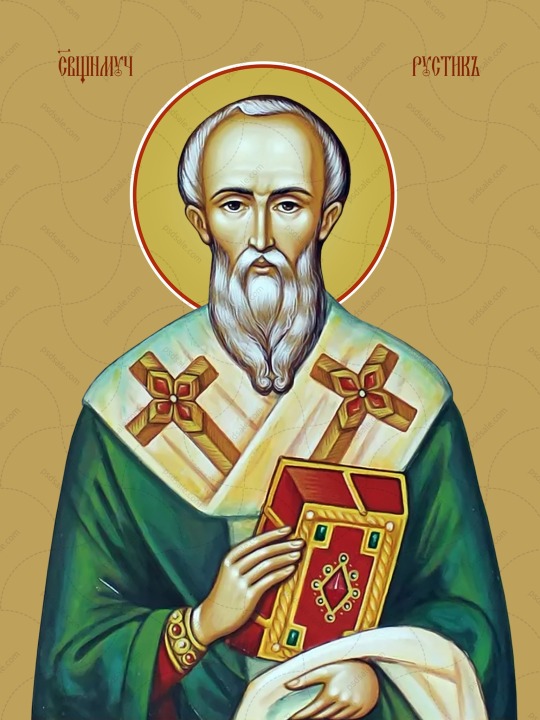
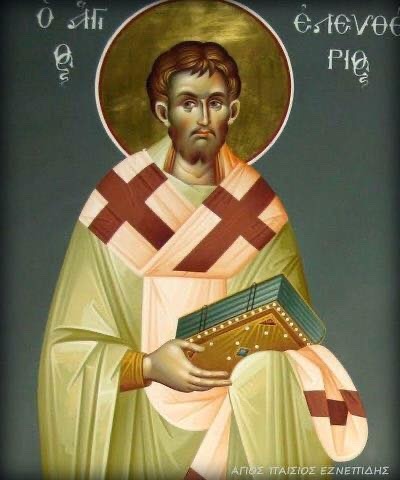
#father troy beecham#christianity#jesus#god#saints#salvation#peace#martyrs#faith#early church#christian persecution#western christianity#eastern Christianity
1 note
·
View note
Text
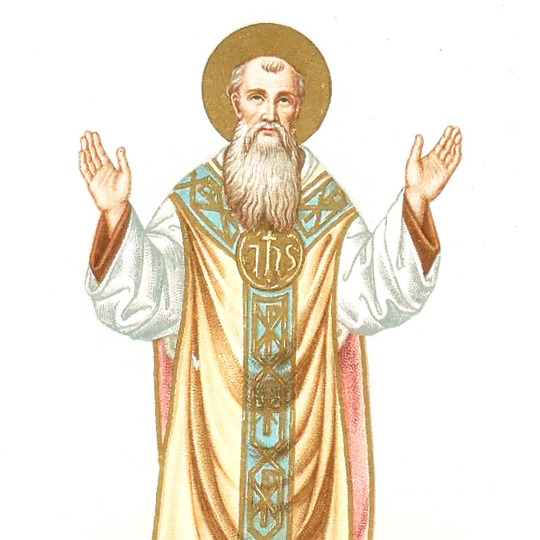
THE DESCRIPTION OF SAINT LAWRENCE OF BRINDISI Feast Day: July 21
"Nos cum prole pia, benedicat Virgo Maria." (Mary, with Her loving Son, bless us each and every one.)
One of the greatest preachers of the Order of Friars Minor Capuchin, Lawrence was born Giulio Cesare Russo, on the feast of St. Mary Magdalene - Brindisi, a city located in the Apulia region at Kingdom of Naples in the year 1559. Showing an early gift for oratory, he was always the one chosen to address, in accordance with the Italian custom, a short sermon to his compatriots on the Infant Jesus during the Christmas festivities. He is raised by a family of Venetian merchants. At the age of 16, he entered the Capuchin Franciscans in Venice, receiving the habit, and changed his name from Cesare to Lawrence.
An accomplished linguist, in addition to his native Italian, Lawrence could read and speak Latin, Hebrew, Greek, German, Bohemian, Spanish, and French fluently. While still a deacon he preached the Lenten sermons in Venice. After his ordination at the age of 23, he became famous throughout Europe as a forceful preacher. He also wrote many theological books and worked for the conversion of the Jews. Lawrence was elected superior of the Capuchin Franciscan province of Tuscany at the age of 31, and appointed definitor general in Rome for the Capuchins in 1596.
Pope Clement VIII assigned him the task of preaching to the Jews in the city. His knowledge of the Hebrew language was of great help in this regard. Beginning in 1599, Lawrence was sent to establish the Capuchin convents in modern Germany and Austria as a barrier agent in Lutheranism, furthering the Counter-Reformation and bringing many Protestants back to the Catholic faith. He also founded friaries in Vienna, Prague, and Graz.
On account of of his holiness, he was named the imperial chaplain of the Christian forces sent by Rudolph II (Rudolf II), Holy Roman Emperor, and successfully recruited Philippe Emmanuel, Duke of Mercœur, against the Ottoman Turks, who were threatening Hungary. Before the Siege of Székesfehérvár (Stuhlweissenburg) in 1601, though the Christians were outnumbered four to one, he gave a rousing address to the troops. Then he himself rode a horse before them, armed with the crucifix in his hand. The Turks were defeated and Europe was saved.
At their chapter of 1602, Lawrence was elected vicar general of the Capuchin friar, at that time the Order's highest office, whom he administered with energy and charity. Despite his fervent apostolate, Lawrence was a man of prayer and learning. He entered the service of the Holy See, becoming papal nuncio to Bavaria. After serving as nuncio to Spain, he retired to a monastery in 1618, and was recalled as a special envoy to the King of Spain regarding the actions of the Viceroy of Naples in 1619, and after finishing his mission, died in Lisbon, Portugal on July 22, 1619 - his 60th birthday.
Beatified by Pope Pius VI on June 1, 1783 and canonized a saint by Pope Leo XIII on the feast of the Immaculate Conception in 1881, Lawrence's remains were entombed at the Poor Clares' Convento de la Anunciada (Convent of the Annunciation) in Villafranca del Bierzo, Spain. Because of his creative yet orthodox writings on the Virgin Mary and for his commanding erudition in, and harmonious presentation of, Scripture, patristics, and fundamental theology, Pope St. John XXIII proclaimed him a Doctor of the Church in 1959.
Lawrence of Brindisi is the third Franciscan Doctor of the Church, along with Saints Bonaventure and Anthony of Padua, and, unfortunately, one of the least well-known.
1 note
·
View note